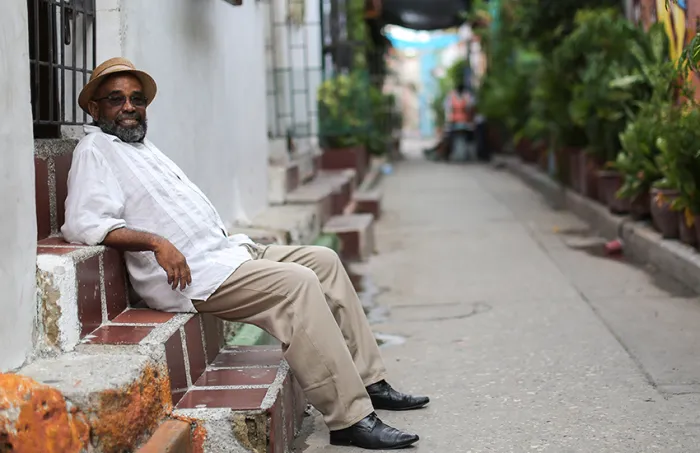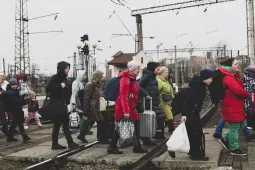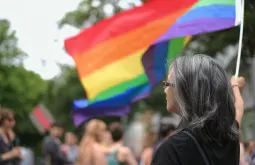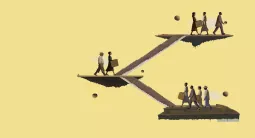In the shadow of time

A young man approaches the backyard porch where hanging clothes dry in the sun. His white shirt and red cross in the bag states a conviction: the disease inhabits the house. She is there to administer vaccines, explains to a relapse woman in a chair. There is no answer, just a mumble inaudibly, disbelieving. In front of her, another old and squalid lady lays entertained with wisps of her ragged dress. Without annoyance or compassion, the nurse pulls a chair, scribbles notes and offers ampoules as if she was selling encyclopedias.
«Before, if one drank plants it was enough. Today people do not do that, run to buy Melhoral», says Rita Barragrande, while massaging the arm marked by the needle. The landlady took the medication cursing the easy solutions for deep evils. The arcuate body, the wrinkles on the face and bitterness in her voice indicates that the life imposed her more torments could sustain hers 56 years. She mutters knee pain, tremors throughout the body, shortness of breath and a «chest tightness» while searching disjointed memory revenue teas for flu.
No matter, she says. She can no longer prepare infusions with leaves of the forest, as many generations have done in the secular community of San Basilio de Palenque, 50 km from Cartagena. The medicine, language and traditional rituals are traces of African culture that yielded the town, similar to a quilombo, the title of Intangible Cultural Heritage of UNESCO. 200 years ago, that was the first black territory recognized as free and autonomous front of a colonial government all over America.
«In this moon one can’t take these vaccines, my father would say to expect the full.» Rita straightens the body in her chair to regain strength for the philosophical clash between the natural healing and vaccines labeled in bar codes. We are in the waning moon, the end of a cycle dredge all the vital energy on Earth. «It may provoke convulsion» she explains.
A grim laugh overlaps the mystique. Sitting in a wheelchair, the old woman disheveled and with the lap on display emerges from her reverie. She seems to notice, suddenly, there is someone else dividing her territory, real or imaginary. She suffered a stroke and had complications, explains Rita, to safeguard her authority in that wilderness backyard in the hills of Colombia, also haunted by the malaise of civilization.
«In everything I need to be perfect, otherwise … everything changes every day, it makes me too stressed out», sighs like an intimate lament before a reality that she doesn’t understand. Its been seven years ago since the last time she left home. She went see a doctor in Cartagena, unwillingly. «He said I have depression, I do not believe. I am ten years in this effort. Some days I can not get out of bed, I lack courage. I know I have something real» she says, as if it were not real the mist that blurs her eyes and fill that home with a dense gloom.
The suffer in one’s mind, says Maria Rita Kehl in her book Time and dog, born with the destruction of a stable network of representations that protect the identity in society. It is a brutal shock, loss of place and references, which brings this cliff into us. It can also assume a character of social symptom. The encounter with the Other, in the accelerated consumption society, is naturalized in internal constraints. So, it emerges discouragement, isolation, tedious and chaotic desert that scrambles the senses and stops.
Rita lives in an empty house, almost without furniture. It became empty after their children moved, she said. They sought plenty, but now make plans to return to the farm to grow food that no longer find in Venezuela. The memory revives her pain and makes her contract the face. «This night I dreamed with a bull, huge and black. It ran through the house behind me… In the dreams, one can do everything as before, I run…. Hence, I wake up», she said, shrugging.
For a second, I looked away and saw the beast advancing on me as if it could sniff the disease. His long strides sank the floor, his tail remitted away the calendar hanging on the wall and the heavy body arched sideways, destroying everything that could narrow its passage. His snout was puffing vigorously, the frothing mouth. I was thirsty. Rita indicated her hiding under a desk, but I faced the beast. I wanted to tame her by the horns.
The crazy old lady laughed, sinister. Rita looked at me waiting for more questions, surprised with my interest in her lamentations. The fog in that airtight yard overlaid me, blurred reality. At that moment, an unreasonable desolation on that place suddenly reignited in me.
There was never a diagnosis. Denying the «widespread pathologizing of private life», as described by Maria Rita Kehl, pushed me away the doctors – just like the disdain of Rita Barragrande. «The heartaches can’t be healed with pharmacy pills», told me the strong woman in perverse struggle against their ghosts. Dealing with my own ghosts, I saw her while in search of a genuine history – rediscovered mine.
Dry sorrow of recent years is only one of the hallmarks of the disease, which penetrates through the veins, thoughts and feelings without permission. Melancholy was like a long eclipse, a turbulent wake of what would be left of me after diagnosis, in 2008, of HIV. Of what other brands would shape me in the next ten year I thought I had as future.
Without dividing that weight, I left my parents’ house. I was 21 and I had a vivid dream. Standing in the doorway, I saw under the double bed comforter, single size. On the desk, there were a few books and blank notebooks. On the wall, a poster by Pierre Verger. Preserved in those small details, I was represented before the journey in search of what would exist beyond. Away, in Paris, I felt trapped in a narrow room with white walls. I cried resentment and, once, the fear of death.
It felt like if the clock was accelerated. As if a countdown were imposing an urgency to have indistinct pleasure. I lived on the run for the immediate, with no ties or even satisfaction. It was desire, and I could feed it with clumsy feints, feigned intensities. I sagged the imperative of pleasure even by simulacra of joy, hedonistic appeals to dull without ever satiate an immeasurable grace. I sagged to any other person, made me their subject, blemishing the naive anxiety to be accepted, to belong, to have a place.
I saw myself as a virus, primitive, unable to build something of my own, just take ownership of others. From my family, I couldn’t honor the effort, so much expectation and love. From the friends, I refused talks, hugs, shares. From the lovers, I denied the feeling itself, even from those who offered shelters. I fed illusions, raised barriers and exposed them to reckless risk. Even my dreams died with the relentless self-judgment. I could devote myself to something else, I knew it. Even so, I chose, consciously or not, wander away from sidewalks and targeting the cars. I cultivated sure that everything in me was wasted.
HIV adds cruelty to a life already marked by the pain of black diaspora. How to strengthen self-confidence and subvert the oppressions, the intangible confinement in a racist and hypocritical normativity? I succumbed. The aversion to labels, a trace from my generation, fermented the self-destructive frivolity. I tried other bodies and faces and, finally, couldn’t recognize no mirror – all of them reflected a dense shadow in my aura, raped in the deepest dimension of identity and belonging.
I remember when I first looked at the cocktail of pills. I prayed, dismissed doubts and took them as they were the source of life. I thought that would be enough. I didn’t yet understand how harmful it would be. The virus does not corrode the body, but the whole host soul. Hard drugs, distributed as Melhoral in public pharmacies, can inoculate their reproduction. But that minimal particle is alive, and as so, stubborn. Even in bombed ground, it takes root to appropriate for himself the meaning of all existence.
Nothing can be more punitive. In AIDS and its metaphors, Susan Sontag reflects how the virus became stigmatized as a symbol of evil. Not because it exposes the voracity of death, but in reason of the moral judgment of the infected. The disease is the conviction of a degenerate character. This is not random, such as cancer. We are guilty for addiction or delinquent sexual behavior. We deserve punishment, public shame. Indefinitely we will carry the brand, the plague, in scratched groups from society by exposing honored citizens to the dangerous and contagious free will.
As the cliffs edge, I clung to the memory. The boy with closed eyes and wide grin on painted clown face, the poster of Pierre Verger, is a souvenir that I revisit looking for the tender joy of youth. Beside him, in a new frame, is a curly-haired girl who levitates while hearing birds in a street compressed by skyscrapers. Every day, I find in her eyes the courage to get awake. I am the two fragments, among others. But still remains a distress of not recognizing in the mirror white hair, skinny body. Perhaps I’ll never again recognize me – and I do not know if I should want.
Melancholy, this dip in intimate abyss, betrays us in just one second. Back to Palenque, I ran for cover. I threw water on the face as it looked vaguely familiar in the bathroom mirror. Beside me, a man looked at me for a few seconds, puzzled, before saying something that immediately placated my chest: «Enjoy life while you can».
Afonso Cárceres, 77, then added: «But be careful with your knees». He had a lilting speech as same as the pitch, sometimes relieving one or another knee. He has a dug face, wispy white beard and slender body, with taut muscles from who once depended on them to survive. The hands are thick and rough, but no longer have power. He wears white pants, shirt and hat, with a leather sandal to seat on the floor his light walk.
I accompanied him to his house, a leisurely walk through the community, including greetings to the elders in the forgotten language and respectful greetings of the youngest. His family is one of the headquarters of the village. His grandchildren and great-grandchildren play in the streets, banging on drums exaltation corners to what they call ‘Africa’, a living memory, more than a geographical or conceptual demarcation. In the Montes de Maria, the palenque is an enclave of the oral tradition, forms of organization and, above all, the ancient philosophy.
«The essence is our strength,» says the old man, when I ask what motivates him to cross the city three times a week to share with young people his archaic knowledge. «If we do not teach them, the recipes and language dies. It is like a seed planted for when we will no longer be here», he argues. His metaphors, always with a mystery tone, feed the fame of ‘griot’, a messenger of the African worldview. In front of his house, he set in the shade of a large almond tree: «Here I observe the time better».
His first job was as a gardener. In the 50, took care of the plants of a fine family and studied at night: «if I did the duty, had no food.» He worked on farms in Venezuela, which earned him an estate where he grows the herbs that relieve pain. In each of the twenty years working out, he visited «even for one day» the woman with whom he lives. They had seven children, one died and two went to college. They stopped to count the grandchildren. «Only death can separates us», declares himself.
The wise man speaks of the end as something concrete, though distant. Time, for him, is the heritage of sacred order. For me it was the executioner that accelerates the validity that I supposed demarcated by the virus. I wanted to leave, but he asked me to let some retribution to those shared minutes. In my western poverty, I thought about money. Afonso accepted it, but his eyes targeted my drug box. «No doctor and no remedy can cure a person who is at the time to die», he said with a brief pause to stare at me. «You can only heal the soul».
I felt a longing of cry. I did not understand, though, that meeting in the shadow of time. Afonso wanted to tell me something else. He said he’d never revealed that recipe, a secret that helped him to overcome dangers in the woods, and against army and guerrillas. «It’s a balm that strengthens the body, calms the mind and nourishes the spirit», he said. It was a prayer. An exorcism against the «poison that wants to run me over» done to the virgin, the holy spirit, witch, lions and panthers.






